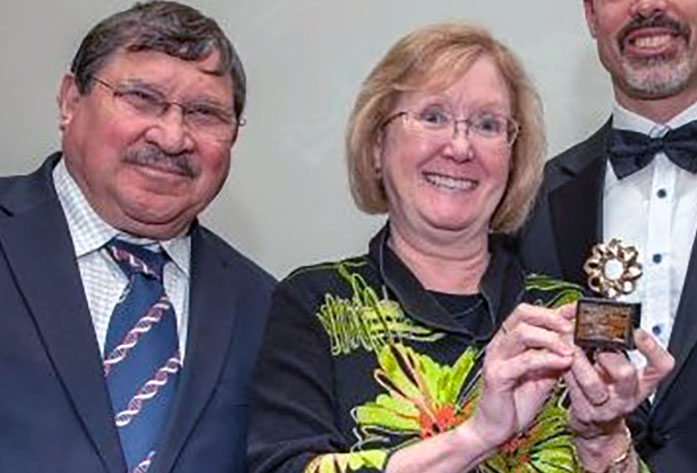
DUBLIN – Clemson scientist Trudy Mackay was honored with the prestigious 2018 Dawson Prize in Genetics at Trinity College Dublin on Thursday.
Mackay is director of Clemson University’s Center for Human Genetics (CHG) and a geneticist of international prominence whose futuristic research continues to move Science forward in the 21st century.
The Dawson Prize, awarded every two to three years, was established by a gift from professor George Dawson (1927-2004), founder of Trinity’s department of genetics. Mackay received a gold miniature of the sculpture “The Double Helix” by the late Brian King.
Mackay is recognized as one of the world’s leading authorities on the genetics of complex traits. Much of her research has focused on the fruit fly Drosophila, which has proved invaluable as a model species for investigating how key genes function. In addition to being director of the Center for Human Genetics, which is part of Clemson’s College of Science, she is also the Self Family Endowed Chair in Human Genetics. Mackay is a fellow of the National Academy of Sciences, the American Association for the Advancement of Science, the American Academy of Arts and Sciences and the Royal Society of London.
Mackay delivered a public lecture on Thursday in which she outlined how geneticists are probing questions that underpin a range of human diseases with the aim of better understanding how these diseases function and how we might prevent or treat them.
“It is a great honor to receive this prestigious award and to join the outstanding scientists who have previously been awarded the Dawson Prize,” Mackay said. “I am particularly pleased that the selection committee has recognized the pivotal role the Drosophila model system has played in our understanding of complex trait genetics. Future advances in understanding the genetic basis of human disease will increasingly rely on research utilizing comparative genetics and genomics to understand the function of the many thousands of variants associated with disease in human populations.”
“The Dawson Prize is a very special award,” said Aoife McLysaght, professor in genetics at Trinity. “It encompasses George Dawson’s passion for genetics, his recognition that science needs to be shared with the public, and his placement of students at the heart of the genetics department – a tradition that happily continues to this day.”
There have been five previous winners: John Sulston (2006), Mary-Claire King (2010), Corey Goodman (2011), Elliot Meyerowitz (2013) and Vishva Dixit (2016).
Sulston, who died this year, was one of the most influential collaborators of the Human Genome Project and winner of the 2002 Nobel Prize in Physiology or Medicine. King, who was awarded the National Medal of Science by President Barack Obama in 2016, has been instrumental in discoveries that have changed the ways we think about cancer. Goodman, an eclectic scientist, educator and entrepreneur, pioneered genetic analysis in Drosophila. Meyerowitz, the 2018 recipient of the Gruber Prize in Genetics, has been a champion for openness and collaboration in scientific research and has been successful in making plant DNA available to a huge number of researchers. Dixit, who is vice president for discovery research at Genentech in San Francisco, has conducted pioneering studies defining the biochemical framework of how cells die.
– Information from Thomas Deane, press officer at Trinity College Dublin, was used in this report.
Get in touch and we will connect you with the author or another expert.
Or email us at news@clemson.edu

